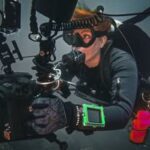Last Updated on January 6, 2025 by Candice Landau
This article was last updated October 13, 2024. Since I originally wrote this post a few years ago, the Crater Lake Institute has added a page to their site that will keep you abreast of the latest information as well. To this day, scuba diving in Crater Lake is still not allowed.
Skip to the bottom of this article for the 2024 update.
That said…Crater Lake is one of my FAVORITE National Parks of all time. You can visit in mid June and experience snow plus the landscape changes so rapidly and is so different depending on where in the park you are at any given time. My first idea for an epic fantasy novel was situated here because of all this. So, diver or not, I highly recommend you visit.
Here are some resources if you intend to go adventuring in Crater Lake National Park:

Crater Lake & Beyond: The Land of Fire & Ice written by by Jim Turner, Jay Newman, and Sue Newman
Crater Lake National Park Map (National Geographic Trails Illustrated Map, 244) by National Geographic Maps
Trails of Crater Lake National Park & Oregon Caves National Monument by William L. Sullivan
Diving Crater Lake: What the NPS Had to Say
Ever since I heard a friend had dived Crater Lake years ago, the place has been a sort of “bucket list” destination for me. The surroundings are beautiful and the water, apparently crystal clear. I really couldn’t imagine a more ethereal place to dive. So, on a quest to find out whether it was still diveable (I’d heard otherwise though no one was 100% sure), I reached out to the National Park Service.
Sadly, when they replied, I had my confirmation. For the moment, scuba diving is not allowed at Crater Lake. Here’s the message I received:
Hello,
Thank you for your inquiry about aquatic activities at Crater Lake National Park. I hope this response answers your questions.
Swimming is allowed in Crater Lake, but the water is cold! Most people swim for only a few seconds or minutes. Swimming is permitted only at Cleetwood Cove and at Wizard Island, which requires a boat tour to reach. Swimmers must remain within 100 yards of shore. The shoreline at both locations is rocky; there are no beaches. The Cleetwood Cove Trail is the only legal access to the shore of Crater Lake. The hike is steep and strenuous: in 1.1 miles (1.7 km) it drops 700 feet (213 meters) in elevation. The trail is recommended only for those in good physical condition. Depending on snow conditions, the trail usually opens in late June and closes in late October.
Scuba diving, snorkeling, and long-distance swimming are not allowed. In the fall of 2012, after a review of potential threats posed by aquatic invasive species, the National Park Service placed a moratorium on the use of diving gear, snorkels, wet suits, flotation devices, and other equipment in Crater Lake that could serve as vectors for the introduction of non-native organisms. The moratorium will continue to be in place during the 2018 summer season.
The National Park Service wants to allow as much opportunity as possible for visitors to enjoy the lake. However, an invasion of new species could have severe consequences on the lake’s ecology. The probability of introduction may be low, but the impact might be irreversible. Preventing the establishment of these species is easier than removing them once they become pervasive. Measures that might be used in other locations, such as treating the water with pesticides, cannot be used here without permanently altering the lake’s ecology and special qualities.
We hope that you can understand our caution on this issue. We welcome your comments and suggestions.
Again, thank you for your inquiry and for your interest in Crater Lake National Park. Please let me know if I can be of further assistance.
Best Regards,
XXXXXXXXX
Park Ranger
As of reaching out in 2024, the response is similar:
Hello,
Thank you for reaching out. They no longer allow scuba recreational scuba diving in the lake. Mainly to protect the lake. Wetsuits and equipment used for scuba diving can bring in nonnative species and bacteria which can be very harmful for the lake. They do very little diving for research anymore as well. As far as I understand there are no large projects that involve scuba diving that would require extra hands, just small random things that the NPS scientists do themselves.
I hope this is helpful and answers your questions,
Ranger XXXXX



















